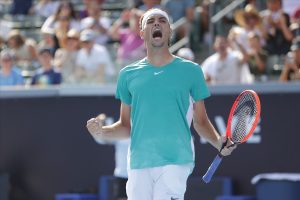Nicolas Kicker, the highest-ranked player ever to be punished for match-fixing, will return to the ATP Tour this week. The Argentinian has been handed a wildcard to the ATP Cordoba Open in his home country. Kicker is making his first appearance on the tour since being banned in May of 2018. His sentence was originally six years, three of which were suspended, but it has been reduced by four months after he agreed to help educate other players about corruption in the sport. Nonetheless, the ATP’s highest ranked match-fixer returning to the tour is a reminder of the continuing issues surrounding match-fixing in the tennis.
Kicker Ban Shines Spotlight on Ongoing Issues in the Sport
Kicker, predominantly a clay court specialist, first appeared on the ATP tour in 2016. In 2017 he had a breakout year and climbed as high as #78 in the world on the back of strong Challenger Tour results and three quarterfinal appearances on the ATP Tour. He may well have continued climbing the ranks on the tour given his play in 2017. However, he was found guilty of match-fixing by the Tennis Integrity Unit (T.I.U) in 2018 and given a six year suspension from the sport as a result. Three of those years were suspended on the condition he commit no more offenses. The ban came at a time when discussions around match-fixing in the sport were common.
In particular, the lower-level tours such as the Challenger and ITF circuits are areas of great concern in this regard. Players on these tours earn barely enough to make a living and keep playing, in fact most don’t. Kicker is a perfect example of this and depended on his parents for much of his time on the Challenger Tour. The matches on the lower tours also attract far less media and fan interest, making them great targets for anyone looking to tempt players into throwing a match for financial incentive.
Challenger and ITF circuits prime targets for match-fixing.
Kicker was convicted of doing just that in two Challenger Tour matches in 2015. In fact, it was unusual betting patterns that brought his match-fixing to the attention of the T.I.U in the first place. The Argentinian was playing Giovanni Lapentti in a Challenger event in Columbia in the match in question. He took the first set at which point the betting odds swung heavily against him, suggesting gamblers knew he was going to lose the match despite taking the lead and betting accordingly. The unusual odds were flagged by many gamblers on social media at the time and the match was eventually investigated. Kicker’s subsequent guilty verdict and ban were hardly a surprise to the tennis world though.
In 2016 Chris Kermode, head of the ATP at the time, rejected claims evidence of match-fixing had been suppressed following the uncovering of a report by the T.I.U detailing widespread suspicions of match-fixing in the sport. The reports outlines 16 top 50 players who were flagged for potentially throwing matches, some of whom were Grand Slam winners. The reports also looked into potential connections between a web of gamblers in Russia, Northern Italy and Sicily who had made hundreds of thousands of pounds betting matches investigators thought to be fixed. Clearly proving match-fixing at the top level is a challenge. However, it is being done in the lower levels of the game.
[pickup_prop id=”5002″]
Evidence of match-fixing Clear to See at Lower Levels
Kicker remains the ATP’s highest ranked match-fixer to be convicted for the offence. Clearly match-fixing remains a difficult task for the T.I.U and other bodies behind such investigations in tennis. However, the evidence of it occurring in lesser known tournaments is clearly there. Karim Hossam, once a promising young talent in North Africa, was banned for life in 2018 for similar offences. His case uncovered the biggest match-fixing network the sport had ever seen. Fortunately he was eventually caught and punished accordingly. However, the people who pulled him into the world of match-fixing have so far escaped detection. They are most likely doing the same things to other similarly financially desperate players.
Kicker has apologised for fixing matches. He has since set out to to make amends for what he did. That attitude has allowed him to return to the tour and the game he loves. Unfortunately he is one of very few able to say they have turned over a new leaf in the sport. His return to the sport will surely be a happy moment for the Argentinian.
For tennis fans, it is a stern reminder that the lower tours are free from glamour. In fact, they consist mostly of professional players hoping to make enough to carry on playing. Continued calls for better financing in the lower circuits are evidence of how bad the problem is. Whilst that remains the case, match-fixers will be able to tempt players into throwing matches. They can offer these players financial rewards the game cannot give them at that level. Kicker’s ban may have ended, but the fight against match-fixing in tennis is still very much ongoing.
Main photo:
Embed from Getty Images






